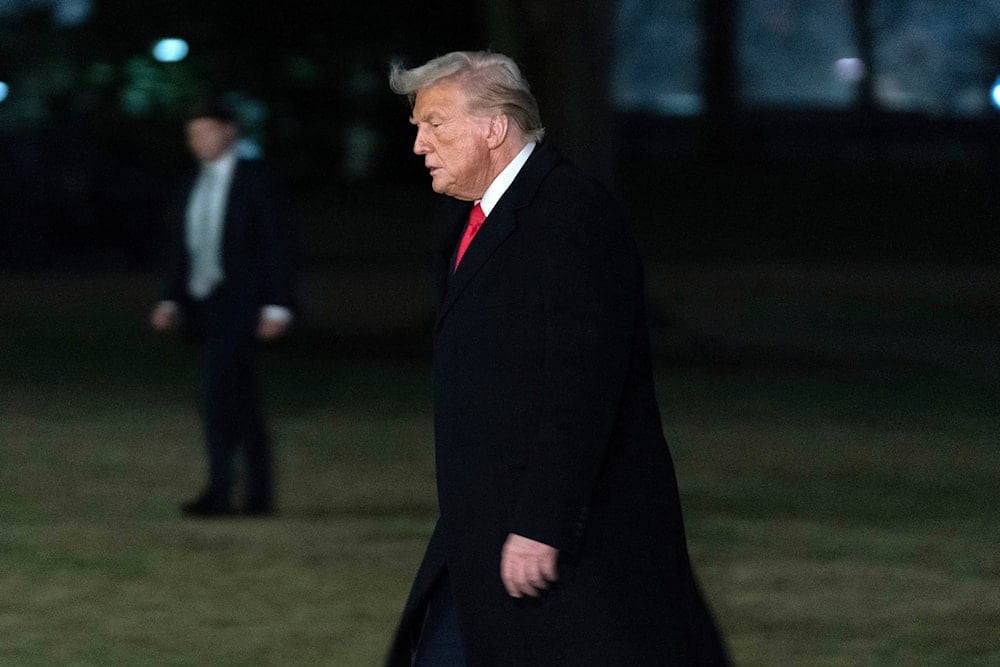Trump to impose 25% tariffs on aluminum, steel
The Premier of Ontario has accused the US president of "shifting goalposts" by imposing additional tariffs on top of existing metal duties, as China’s fossil fuel levies take effect.
-

US President Donald Trump arrives on the South Lawn of the White House, in Washington, Monday, February 10, 2025. (AP)
US President Donald Trump has announced plans to implement new 25% tariffs on all steel and aluminum imports into the US starting Monday, a move that will impact major trading partners, including Canada and Mexico.
Describing the measure as affecting "everybody," Trump’s decision marks another significant escalation in his trade policy overhaul.
Trump's pre-announcement came as China’s retaliatory tariffs, introduced last week, officially took effect. These countermeasures target $14 billion worth of US exports, imposing a 15% tariff on coal and liquefied natural gas (LNG) and a 10% tariff on crude oil, farm equipment, and certain vehicles.
Speaking to reporters aboard Air Force One on Sunday, Trump also confirmed plans to introduce reciprocal tariffs—matching US tariff rates to those of its trading partners—by Tuesday or Wednesday, stating they would take effect "almost immediately." He justified the move by saying, "And very simply, it’s, if they charge us, we charge them."
The decision on steel and aluminum was met with strong criticism from Doug Ford, the premier of the Canadian province of Ontario, who accused Trump of "shifting goalposts and constant chaos" that could endanger the economy. These new duties will be applied on top of existing metal tariffs.
According to data from the US government and the American Iron and Steel Institute, the largest sources of US steel imports are Canada, Brazil, and Mexico, followed by South Korea and Vietnam.
Canada remains the dominant supplier of primary aluminum metal, accounting for 79% of total US imports in the first 11 months of 2024, while Mexico is a key supplier of aluminum scrap and alloys.
During his first term, Trump imposed steel and aluminum tariffs at 25% and 10%, respectively, but later granted duty-free quotas to some trading partners, including Canada, Mexico, and Brazil.
Global leaders push back as Trump’s tariffs spark economic tensions
Joe Biden later extended these tariff exemptions to Britain, Japan, and the European Union, though US steel mill capacity utilization has declined in recent years. White House spokesperson Karoline Leavitt confirmed that the new tariffs would be applied on top of the existing duties on steel and aluminum.
Trump’s tariff strategy has faced widespread criticism, sparking market volatility and concerns over potential further measures. While Beijing has formally lodged a complaint with the World Trade Organization, its overall response has been restrained. Analysts noted that China had anticipated the tariffs, which were significantly lower than the levels Trump had threatened during his election campaign.
China’s countermeasures, including investigations into US companies such as Google, were viewed by analysts as a measured response that left room for negotiations.
Meanwhile, global leaders have pushed back against Trump’s economic policies. French President Emmanuel Macron, in an interview broadcast Sunday, warned that he was prepared to go "head-to-head" with Trump on tariffs, stating, "I already did so, and I will did (sic) it again."
Macron also challenged the US focus on European trade, telling CNN that the EU should not be a "top priority" for Washington. "Is the European Union your first problem? No, I don’t think so. Your first problem is China, so you should focus on the first problem," he said.
While acknowledging that tariffs would negatively impact both Europe and the US due to deep economic ties, Macron warned that increased costs could fuel inflation in America.
"It means if you put tariffs on a lot of sectors, it will increase the costs and create inflation in the US. Is it what your people want? I’m not so sure," he remarked.
Macron emphasized that the European Union must be prepared to respond but should primarily "act for ourselves." He outlined his vision for the bloc’s future, stating, "This is why, for me, the top priority of Europe is competitiveness agenda, is defense and security agenda, is AI ambition, and let’s go fast for ourselves." However, he added that if tariff disputes arose, "we will discuss them and we will fix it."
Trump has long criticized the EU for imposing a 10% tariff on auto imports, far higher than the US rate of 2.5%. He frequently claims that Europe "won’t take our cars" while shipping millions of vehicles across the Atlantic annually.
In addition to targeting European trade, Trump has also signaled potential tariffs on Taiwan’s semiconductor industry, accusing it—without evidence—of stealing US business.
In response, Taiwan appears to be taking steps to avert trade penalties. This week, senior economic officials are set to travel to the US for discussions with their counterparts.
Additionally, Taiwan’s government and state-run petroleum company are reportedly working to increase imports of US gas and oil to help narrow Taiwan’s trade surplus, a key justification cited by Trump for imposing tariffs.

 5 Min Read
5 Min Read









